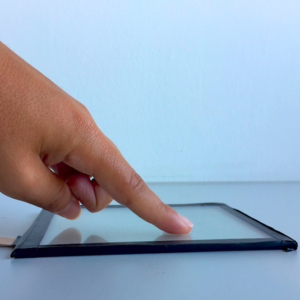Dataset for Finger Motion and Contact by a Second Finger Influence the Tactile Perception of Electrovibration
2021
Miscellaneous
hi
Electrovibration holds great potential for creating vivid and realistic haptic sensations on touchscreens. Ideally, a designer should be able to control what users feel independent of the number of fingers they use, the movements they make, and how hard they press. We sought to understand the perception and physics of such interactions by determining the smallest 125 Hz electrovibration voltage that fifteen participants could reliably feel when performing four different touch interactions at two normal forces. The results proved for the first time that both finger motion and contact by a second finger significantly affect what the user feels. At a given voltage, a single moving finger experiences much larger fluctuating electrovibration forces than a single stationary finger, making electrovibration much easier to feel during interactions involving finger movement. Indeed, only about 30% of participants could detect the stimulus without motion. Part of this difference comes from the fact that relative motion greatly increases the electrical impedance between a finger and the screen, as shown via detailed measurements from one individual. In contrast, threshold-level electrovibration did not significantly affect the coefficient of kinetic friction in any conditions. These findings help lay the groundwork for delivering consistent haptic feedback via electrovibration.
| Author(s): | Yasemin Vardar and Katherine J. Kuchenbecker |
| Year: | 2021 |
| Month: | March |
| Day: | 15 |
| Publisher: | Dryad |
| Department(s): | Haptic Intelligence |
| Research Project(s): |
Understanding the Perception of Electrovibration
|
| Bibtex Type: | Miscellaneous (misc) |
| DOI: | 10.5061/dryad.9ghx3ffgp |
| How Published: | Dataset |
| State: | Published |
|
BibTex @misc{Vardar21-DRYADDS-Electrovibration,
title = {Dataset for Finger Motion and Contact by a Second Finger Influence the Tactile Perception of Electrovibration},
author = {Vardar, Yasemin and Kuchenbecker, Katherine J.},
howpublished = {Dataset},
publisher = {Dryad},
month = mar,
year = {2021},
doi = {10.5061/dryad.9ghx3ffgp},
month_numeric = {3}
}
|
|



